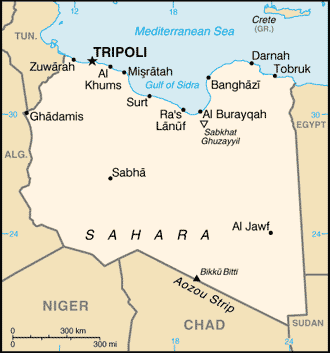| Libya
Map Courtesy CIA World Factbook
The name "Libya" derives from the ancient Egyptian term "Lebu", referring to Berber peoples living east of the Nile, and adopted into Greek as "Libya". In ancient Greece, the term had a broader meaning, encompassing all of North Africa west of Egypt, and sometimes referring to the entire continent of Africa. Tripoli and Cyrenaica were Roman colonies; and were conquered by Arab Muslims in the 7th century. By the 19th century it was an increasingly independent Ottoman province; and came under the control of Italy in 1912. After the Second World War Libya was granted independence, as a condition of the Allied peace treaty with Italy. Since 1969 Libya has been ruled by Colonel Moammar al-Qadhafi, who came to power in a coup and deposed the Libyan monarchy of King Idris. Qadhafi rejected both Soviet Communism and Western capitalism and claimed that he was charting an independent course, portraying himself as a champion of "oppressed peoples" and Third World nations seeking to assert their independence on the international stage. U.S.-Libyan relations deteriorated when in December 2, 1979, Libyan mobs sacked the United States embassy in Tripoli. Qadhafi referred to the incident it as a "spontaneous demonstration" and denied any involvement. It is suspected that he ordered the attack to show sympathy for Ayatollah Khomeini and the new government of Iran. In May 1980, the United States withdrew all U.S. diplomats but did not break off diplomatic ties with Libya. In 1980, the Libyan government paid Jimmy Carter's brother, Billy Carter, $220,000 to persuade better diplomatic relations between the two nations. On May 6, 1981, four and a half months after Ronald Reagan became president of the United States, the United States government blamed the Libyan government for sponsoring international terrorism. All Libyan diplomats were expelled from the United States and the United States officially broke diplomatic relations between the two nations. The Libyan embassy was also shut down. The Reagan administration saw Libya as an unacceptable player on the international stage because of its backing of Palestinian armed groups, its support for revolutionary Iran in its 1980-1988 war against Saddam Hussein's Iraq (see Iran-Iraq War), and its assistance for guerrilla movements in different parts of the world, many which were conducted by separatist groups such as: The Provisional Irish Republican Army (IRA), Euskadi Ta Askatasuna (ETA) and the Palestine Liberation Organization (PLO). In March 1982 the U.S. declared a ban on the import of Libyan oil and the export to Libya of U.S. industrial technology items, most of which were used for oil; Europe did not follow suit. Relations between the UK and Libya became strained following the 1984 Libyan Embassy Siege. The U.S. attacked Libyan patrol boats from January to March 1986 during clashes over access to the Gulf of Sidra, which Libya claimed as territorial waters but was not recognized internationally. Qadhafi had long referred to it as the "line of death". Later, on April 14, 1986, Reagan ordered major bombing raids against so-called "terrorist sites" Tripoli and Benghazi that killed approximately 60 people following U.S. accusations of Libyan involvement in a bomb explosion at the German La Belle nightclub frequented by U.S. servicemen on April 5, which had killed 3. Among the victims of the April 14 bombing raid was the adopted daughter of Qadhafi. The United Nations imposed sanctions against Libya in 1992 following the Pan Am Flight 103 Lockerbie disaster. The sanctions were lifted on September 12, 2003, after Libya agreed to accept responsibility and make payment of US $2.7 billion to the families of those who died in the bombing. In the same vein, on February 26, 2004, the United States lifted its 23-year travel ban to Libya, and on September 21, 2004, eliminated remaining economic sanctions against the former pariah, lifting the prohibitions of the Libyan Sanctions Regulations, 31 C.F.R. Part 550, and unblocking property and property interests previously blocked under those regulations.
|
|||||||||||||||||
 The Great Socialist People's Libyan Arab Jamahiriya or Libya (Arabic: ليبيا, transliterated Lībiyyā) is a country in North Africa, bordering the Mediterranean Sea, located between Egypt on the east, Sudan on the southeast, Chad and Niger on the south and Algeria and Tunisia to the west. Its capital city is Tripoli. The three traditional parts of the country are Tripolitania, the Fezzan and Cyrenaica.
The Great Socialist People's Libyan Arab Jamahiriya or Libya (Arabic: ليبيا, transliterated Lībiyyā) is a country in North Africa, bordering the Mediterranean Sea, located between Egypt on the east, Sudan on the southeast, Chad and Niger on the south and Algeria and Tunisia to the west. Its capital city is Tripoli. The three traditional parts of the country are Tripolitania, the Fezzan and Cyrenaica.